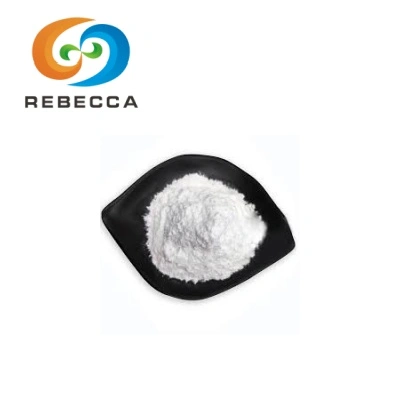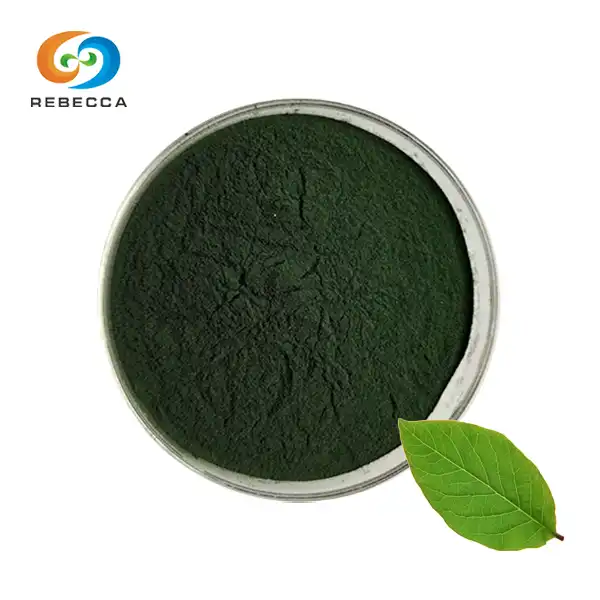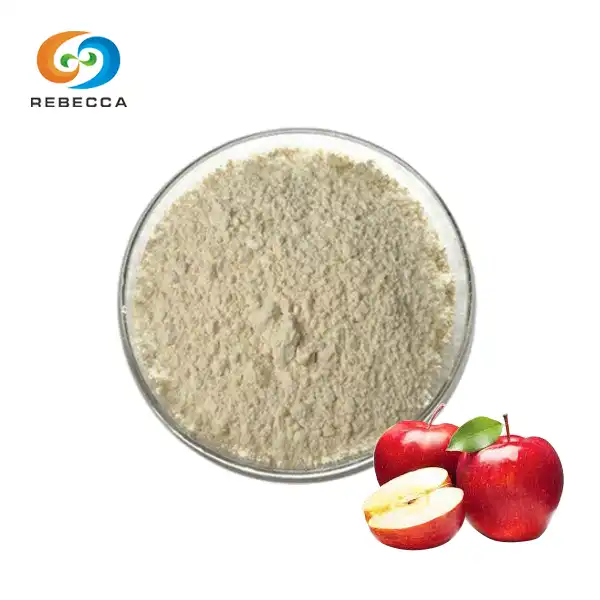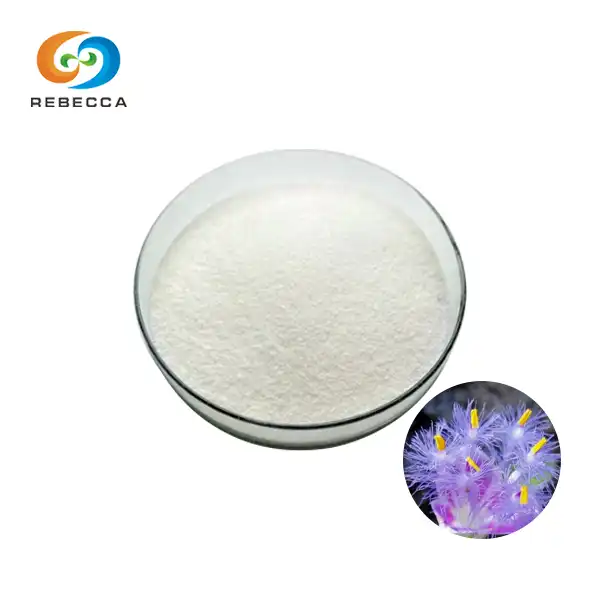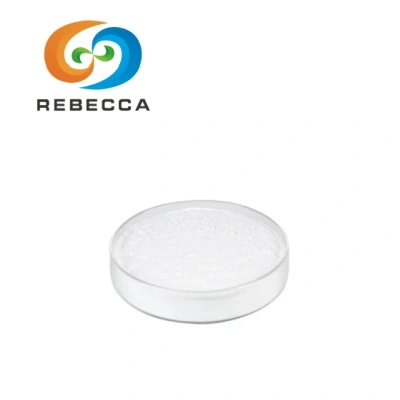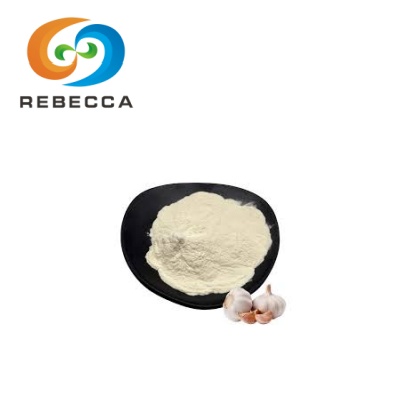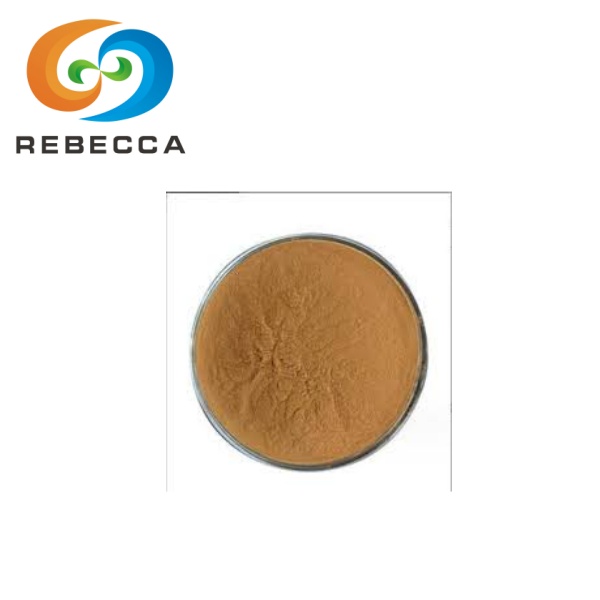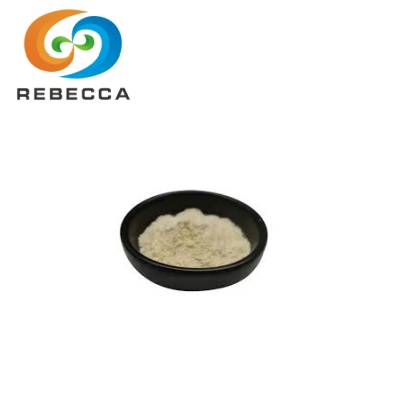What the difference between aloe vera juice gel and extract?
Aloe vera, nature's wonder plant, has been revered for centuries due to its remarkable healing properties. But have you ever wondered about the various forms it comes in? Juice, gel, and aloe vera extract - each offers unique benefits, but understanding their differences can be perplexing. Let's dive into the world of aloe vera and unravel the mystery behind these popular formulations.
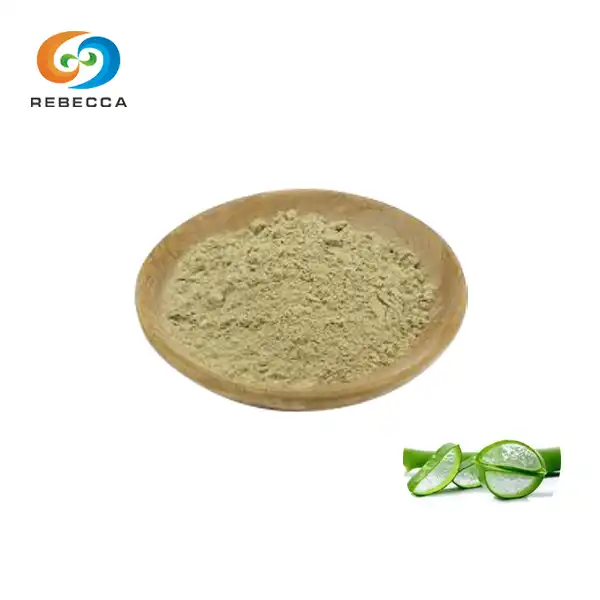
Aloe Vera Extract Powder
Product Name: Aloe Vera Extract
Appearance: Green brown fine powder
Specification: Aloin 20%,Aloin 10%
Test Method: HPLC
CAS No: 1415-73-2
Particle Size: 80 Mesh
Key Composition Differences Explained Simply
At first glance, aloe vera juice, gel, and extract might seem interchangeable. However, their composition and processing methods set them apart. Let's break it down in simple terms:
Aloe Vera Juice
Aloe vera juice is primarily the liquid extracted from the plant's leaves. It's often diluted and may contain small bits of pulp. The juice is rich in polysaccharides, vitamins, and minerals. It's typically consumed orally for its potential digestive benefits and hydrating properties.
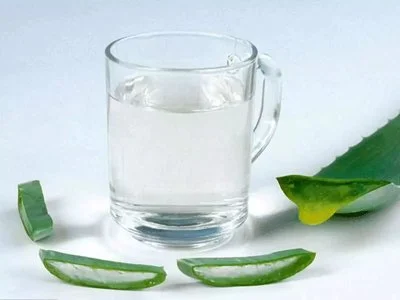
Aloe Vera Gel
The gel is the clear, jelly-like substance found inside the aloe leaf. It's thicker than juice and contains a higher concentration of beneficial compounds. Aloe vera gel is renowned for its soothing and moisturizing effects on the skin. It's commonly used topically for sunburns, minor cuts, and as a natural moisturizer.
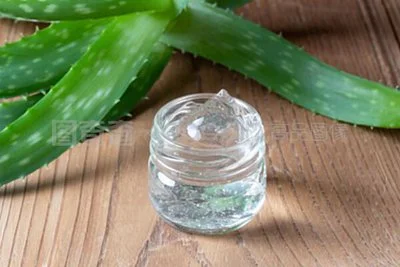
Aloe Vera Extract
Aloe vera extract is a concentrated form of the plant's active ingredients. It's typically produced through a more intensive extraction process, which isolates specific compounds like aloin. The extract is often used in supplements and cosmetic products due to its potency and versatility.
One notable form of aloe vera extract is the powder. For instance, aloe vera extract powder can be highly concentrated, with specifications such as 20% or 10% aloin content. This potent form allows for easy incorporation into various products and formulations.
Usage Scenarios for Juice, Gel, and Extract
Understanding the unique properties of each aloe vera form helps in choosing the right one for your needs. Let's explore some common usage scenarios:
Aloe Vera Juice: Internal Health Boost
Aloe vera juice shines when it comes to internal applications. Many people incorporate it into their daily routine for potential digestive benefits. Some mix it with water or smoothies as a refreshing drink. However, it's crucial to note that while some studies suggest positive effects on digestion, more research is needed to confirm these benefits conclusively.
Aloe Vera Gel: Topical Skin Savior
The gel form of aloe vera is a go-to for skin care enthusiasts. Its cooling and soothing properties make it ideal for treating sunburns, minor cuts, and skin irritations. Many people use it as a natural moisturizer, appreciating its lightweight feel and quick absorption. Some even freeze aloe vera gel into ice cubes for an extra cooling effect on hot summer days.
Aloe Vera Extract: Concentrated Power
Aloe vera extract, particularly in powder form, finds its place in various industries. Cosmetic companies often incorporate it into skincare products for its potent antioxidant properties. Supplement manufacturers use it in capsules or tablets, aiming to harness its concentrated benefits. The extract's versatility makes it a valuable ingredient in many formulations.
Which Form Suits Your Skincare Needs Better?
Choosing between aloe vera juice, gel, and extract for skincare depends on your specific needs and preferences. Here's a quick guide to help you decide:
For Everyday Moisturizing
If you're looking for a light, daily moisturizer, aloe vera gel is your best bet. Its natural composition closely mimics the plant's inner leaf, providing hydration without feeling heavy or greasy. It's particularly beneficial for those with oily or combination skin types.
For Intensive Treatments
When you need a more potent solution, aloe vera extract might be the way to go. Products containing aloe extract often offer concentrated benefits, making them suitable for targeted treatments. For instance, a face mask or serum with aloe extract could provide a boost of antioxidants and potentially help with skin concerns like fine lines or uneven texture.
For Sensitive Skin
If you have sensitive skin, you might find aloe vera juice to be gentle enough for your needs. When applied topically, it can provide a light layer of hydration without the risk of irritation that some more concentrated forms might pose. However, always patch test new products, regardless of their aloe content.
Remember, the effectiveness of any skincare product can vary from person to person. What works wonders for one individual might not yield the same results for another. It's always a good idea to consult with a dermatologist or skincare professional to determine the best aloe vera formulation for your specific skin type and concerns.
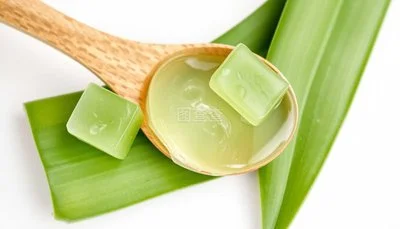
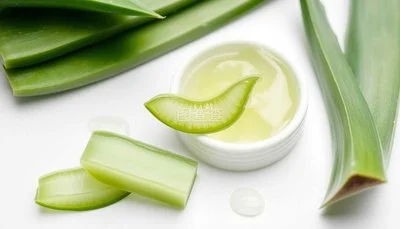
Aloe Vera Extract Manufacturer: Rebecca Bio-Tech
When it comes to high-quality aloe vera extract, Rebecca Bio-Tech stands out as a reliable supplier. Specializing in plant extracts, herbal active ingredient separation, and traditional Chinese herbal medicine functional compound research, Rebecca Bio-Tech is committed to providing premium natural herbal extracts to customers worldwide.
Their aloe vera extract powder is a testament to their expertise. With specifications including 20% and 10% aloin content and a fine 80 mesh particle size, this green-brown powder is perfect for various applications in the pharmaceutical, health products, beverage, and cosmetic industries.
If you're looking to harness the power of aloe vera extract in your products, don't hesitate to reach out to Rebecca Bio-Tech. Their team of experts is ready to assist you with any inquiries. Contact them at information@sxrebecca.com to learn more about their high-quality aloe vera extract and how it can benefit your formulations.
FAQ
Q1: Can I use aloe vera juice directly on my skin?
A: While aloe vera juice is primarily intended for internal consumption, some people do use it topically. However, for skin application, aloe vera gel is generally more suitable due to its thicker consistency and higher concentration of beneficial compounds. If you choose to use juice on your skin, ensure it's pure aloe vera juice without added ingredients that might irritate your skin.
Q2: How long does aloe vera extract powder last?
A: When stored properly in a cool, dry place away from direct sunlight, aloe vera extract powder can typically last for up to two years. However, it's always best to check the expiration date provided by the manufacturer. At Rebecca Bio-Tech, we ensure our aloe vera extract powder maintains its potency throughout its shelf life when stored as recommended.
Q3: Is aloe vera extract safe for all skin types?
A: Generally, aloe vera extract is considered safe for most skin types. However, as with any new skincare ingredient, it's wise to perform a patch test before full application. Some individuals may be allergic to aloe vera. If you have particularly sensitive skin or any existing skin conditions, consult with a dermatologist before incorporating aloe vera extract into your skincare routine.
References
1. U.S. Food and Drug Administration (FDA). (2024). Code of Federal Regulations Title 21, Part 182 — Substances Generally Recognized as Safe: Aloe vera.
2. European Food Safety Authority (EFSA). (2018). Safety of hydroxyanthracene derivatives for use in food.
3. World Health Organization (WHO). (1999). WHO Monographs on Selected Medicinal Plants – Volume 1: Aloe vera (L.) Burm.f. Geneva: World Health Organization.
4. Boudreau, M. D., & Beland, F. A. (2006). An evaluation of the biological and toxicological properties of Aloe barbadensis (Miller), Aloe vera. Journal of Environmental Science and Health, Part C, 24(1), 103–154.
5. Surjushe, A., Vasani, R., & Saple, D. G. (2008). Aloe vera: a short review. Indian Journal of Dermatology, 53(4), 163–166.
